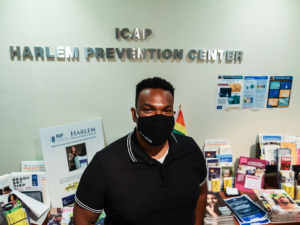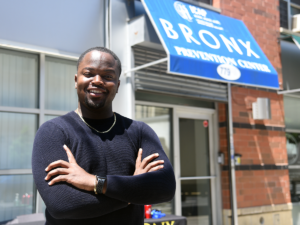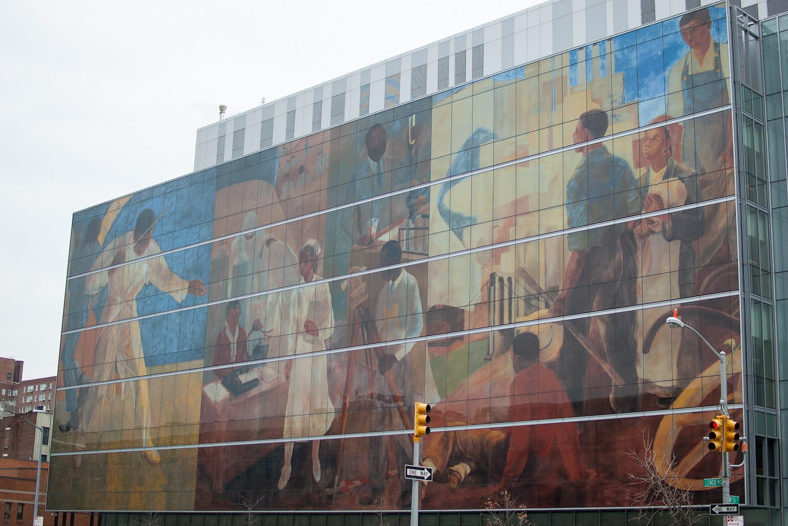When Wafaa El-Sadr, MD, MPH, MPA, founded ICAP in 2003, it was to galvanize efforts and tackle the HIV crisis affecting millions across the globe. Much of her inspiration to do this work and establish ICAP came from her experiences working at the Harlem Hospital Center in New York City in the 1980s.
New York City was hit hard by the HIV, with predominantly Black and Latinx neighborhoods such as Harlem facing the brunt of the epidemic. This was followed by a resurgence of tuberculosis in the City due both to the growing HIV epidemic and overcrowding in homeless shelters.
During this time, El-Sadr led the Harlem Hospital’s Division of Infectious Diseases. She was among the first public health professionals to advocate for integrated treatment and research of HIV through the provision of comprehensive care that was combined with access to participation in clinical trials.
“It was a very difficult time – people losing their loved ones, people losing their families, and in the context of a disenfranchised community, there were glaring inequities,” said El-Sadr. She worked with her team to shape programs that met the needs of individuals and families while engaging community voices in the research enterprise.
El-Sadr’s work at Harlem Hospital with her colleague, Elaine Abrams—now a key leader and senior research director at ICAP—formed the foundation that shaped ICAP’s global mission. This same commitment continued with the establishment of ICAP’s two New York City-based clinical research centers in Harlem and the South Bronx.


Charles Alston’s mural of Magic in Medicine (L) is situated opposite his Modern Medicine (R) at Harlem Hospital, demonstrating the contrast between traditional and modern healing practices. The Magic in Medicine mural represents the history of African healing and medicine, while the Modern Medicine mural represents Western medicinal practices, including the microscope, nurses, and doctors (Credit: Columbia University, Institute for Research in African-American Studies)
Harlem Hospital has a unique place in the history of the African American community. Since it opened its doors more than 130 years ago to serve the Harlem community, this public hospital has focused on responding to the needs of its neighboring communities of color and on providing a training ground for generations of health providers, particularly African American physicians and nurses.
In 1919, Louis T. Wright, MD, a surgeon and civil rights activist, became the first African American physician on staff at Harlem Hospital and the first in any New York City municipal hospital. At Harlem Hospital, Dr. Wright founded the hospital’s cancer research center and joined a movement to ensure African American doctors and nurses could serve in New York’s municipal hospitals.
In 1948, Margaret Morgan Lawrence, MD, became the first African American to complete a residency at the New York Psychiatric Institute and served as the chief of Development Psychiatry Service for Infants and Children at Harlem Hospital for over 20 years.
It was also at Harlem Hospital where a school of nursing was established in 1923 to provide education and training for African American nurses, while other hospitals refused to admit such students. In 1958, Harlem Hospital was where Dr. Martin Luther King Jr. received treatment after he was stabbed while giving a speech.


Yan Rivera, clinical research coordinator at the Harlem Prevention Center (L) and Jawindy Swengbe, community outreach assistant at the Bronx Prevention Center (R)
Drawing from community-centered and family-focused approaches first pioneered at Harlem Hospital, ICAP’s Harlem and Bronx Prevention Center Clinical Research Sites have, over the past two decades, continued to provide the opportunity for community members to access research studies focused on HIV prevention and, most recently, COVID-19 prevention.
“By working closely with community-based organizations, religious leaders, political groups, and members of the Black and Latinx communities in Harlem and the Bronx, ICAP has created meaningful and long-lasting relationships with partners who help engage community members in cutting-edge public health research,” said Julie Franks, PhD, senior research associate at ICAP’s clinical and training unit and founding staff member of the Harlem Prevention Center Clinical Research Site.
As the COVID-19 pandemic continues to impact the global community, in the United States, Black and Latinx communities have borne the brunt of this disease.
“Existing systemic health and social inequities have resulted in higher COVID-19 death rates among these populations,” said Sharon Mannheimer, MD, who oversees the Harlem Prevention Clinical Research Site and serves as the chief of Infectious Diseases at Harlem Hospital.
Recognizing the enormous needs in the Bronx, which includes the poorest congressional district in the country, the Bronx Prevention Clinical Research Site has also established strong connections with the community. ICAP’s senior technical director, Jessica Justman’s, MD, decades of experience working at Bronx Lebanon Hospital and its community has also guided the site to successfully implement its research studies.
“Knowledge of the community is critical to the success of the site and the various research studies it has implemented,” said Jessica Justman, MD, ICAP’s senior technical director, whose decades of experience working at Bronx Lebanon Hospital has guided the research site.
For ICAP, the drive to further health justice builds on its deep roots in the communities that it serves. In 2020, in the wake of the Black Lives Matter protests, ICAP pledged to be an antiracist organization committed to maintaining a work environment free from discrimination and fostering a nurturing community founded on the fundamental dignity and worth of all. A Task Force on Racism and Injustice was established to focus on promoting open dialogue on topics of racism and inequality, and to develop an organizational plan to address structural inequalities and implicit bias in the workplace.
This Black History Month, ICAP commemorates the contributions of African American health workers, public health officials, and communities, and pledges to continue addressing racial inequalities in health.
About ICAP
A major global health organization that has been improving public health in countries around the world for nearly two decades, ICAP works to transform the health of populations through innovation, science, and global collaboration. Based at Columbia Mailman School of Public Health, ICAP has projects in more than 30 countries, working side-by-side with ministries of health and local governmental, non-governmental, academic, and community partners to confront some of the world’s greatest health challenges. Through evidence-informed programs, meaningful research, tailored technical assistance, effective training and education programs, and rigorous surveillance to measure and evaluate the impact of public health interventions, ICAP aims to realize a global vision of healthy people, empowered communities, and thriving societies.








